"I trust in nature for the stable laws of beauty and utility. Spring shall plant and autumn garner to the end of time." -Robert Browning
Like everything else that we know of in the Universe -- galaxies, stars, and planets -- human beings are made out of atoms.
And just like galaxies, stars and planets, over 99.9% of the mass of your body isn't just made up of atoms, it's made out of the nuclei of those atoms.
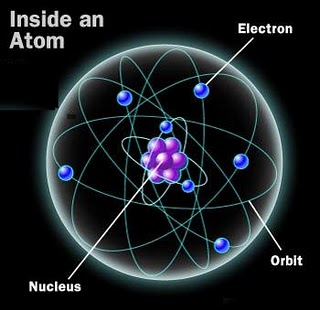
And if you go inside these atoms, into the heart of them, you'll find that these nuclei are combinations of two simple nucleons: the proton and the neutron. Bound together in hundreds of different combinations, protons and neutrons not only determine what type of element your atom is, they also determine whether or not your atom is stable.
And inside the human body, there are, literally, more than 1028 atoms that make you up.
More than 10,000,000,000,000,000,000,000,000,000 atoms in every single human body. Now, some of these atoms are well known to be radioactive, like bismuth, uranium, and thorium, but even these elements always conserve the total number of nucleons.
Even a free neutron -- unstable though it is -- decays into a proton (and some other stuff), conserving the total number of nucleons.
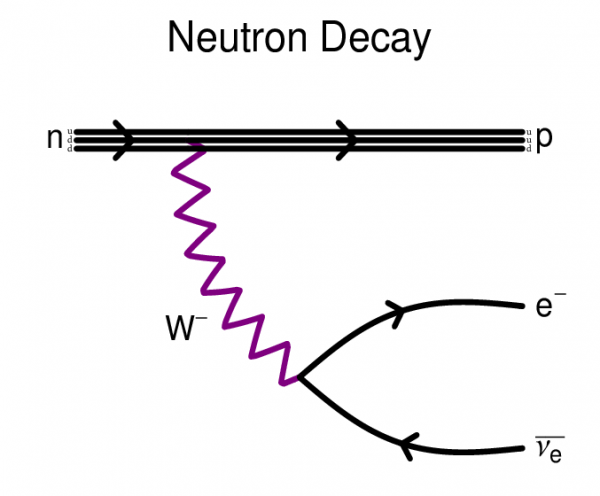
But what about the protons, you might ask? More than 1027 of the atoms in every human are simple hydrogen atoms, with just a single proton for a nucleus.
Is it possible that these protons themselves are unstable? According to many ideas in physics (such as Grand Unified Theories), the proton itself can decay!
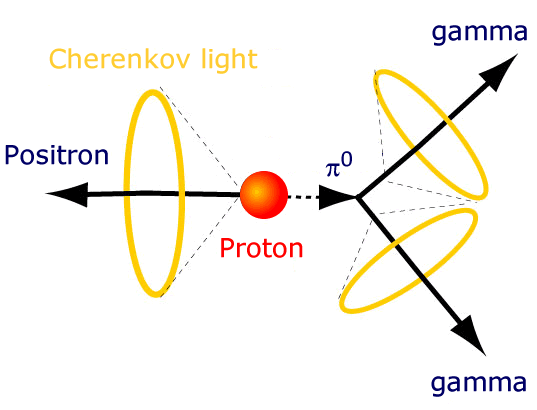
But if it does decay, it must be very long lived. Unlike a neutron, which decays after 15 minutes or so, the proton must live an incredibly long time.
We can figure this out just by using our bodies! With (to be a little more precise) 4 x 1027 plain old protons inside you -- from the nuclei of your hydrogen atoms -- you couldn't have too many of them decaying, or you yourself would release too much energy!
How's that?
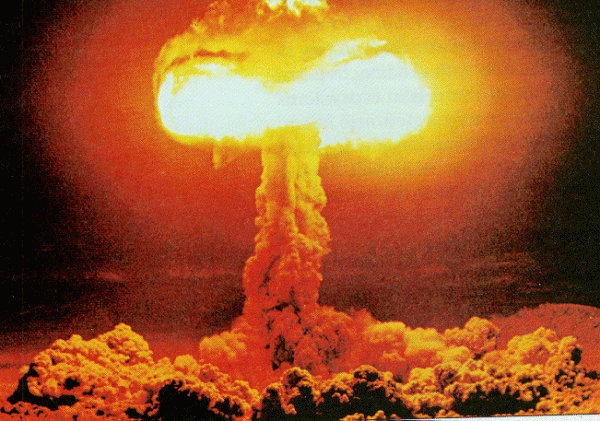
The same conversion of matter into energy that drives the Sun and atomic bombs could also result from something as seemingly benign as a proton being inherently unstable.
Well, you know what? Humans do emit energy, like all warm blooded mammals.
It isn't obvious in visible light, but if you look in infrared light, you get to see that humans, relative to their outside environments, are constantly radiating their heat away to the cooler air around them.
In order to keep yourself at the proper temperature, you need to expend energy to make up for what you're constantly radiating away, as we learned last time. For a full-grown human about my size, doing the calculation shows that I need to be outputting around 100 Watts of power: that's 100 Joules of energy every second, just like an incandescent light bulb.
Even if you were getting 100% of this energy from decaying protons, that limits the number of protons that could decay each second, within your body, to no more than about 600 billion.
But based on the tremendous number of protons in your body, you can figure out that -- on average -- it takes at least hundreds of millions of years for a typical proton to decay. Now in reality, we don't get our 100 Watts of power from decaying protons.

We get it from chemical energy, mostly from eating bunnies calorie-rich foods. It takes about 2,000 food calories a day just to keep an adult male's body temperature normal. (In fact, one of the earliest symptoms of undernourishment is a drop in body temperature.)
But if we want to test as accurately as possible whether protons decay or not, you know how to do it. You get as many of them together as possible, build a giant detector around them, and look for the telltale signature of their decay.
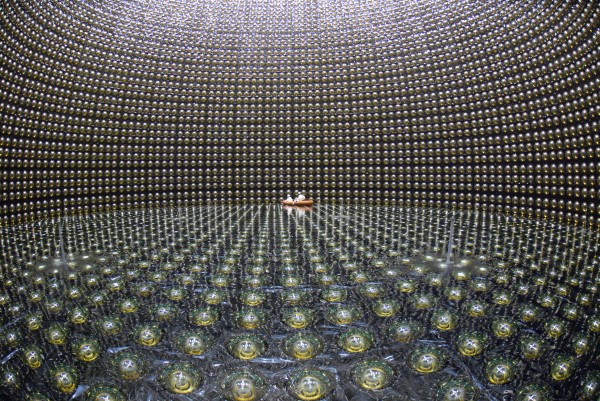
In Kamioka, Japan, they did just that. They built a tank with thousands of tonnes of water inside, and photon detectors all around the outside. If any of the protons decayed, the high-energy decay products would give off telltale light signals, allowing us to not only measure whether anything decayed, but how many of these atoms decayed.
You take a tank of 1032 protons, wait a year, and if none of them decay, you know that the proton has a half-life of at least 1032 years!
And while these setups of giant tanks have proven incredibly useful for detecting cosmic neutrinos, all the experiments ever done have given null results for proton decays. Overall, the best constraints we have tell us that the lifetime of a proton is at least 1035 years, which is really not bad, considering that the Universe itself is only about 1010 years old!
The proton is so stable that it actually presents a problem for a significant number of Grand Unified Theories. In fact, just based on this constraint, we can say that, at most, there's only a 0.001% chance of even one proton in your body decaying over your entire life! And that's how stable, at a fundamental level, the stuff we're made out of really is!

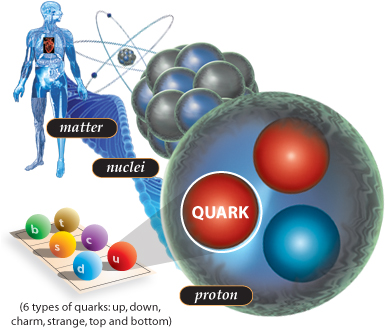
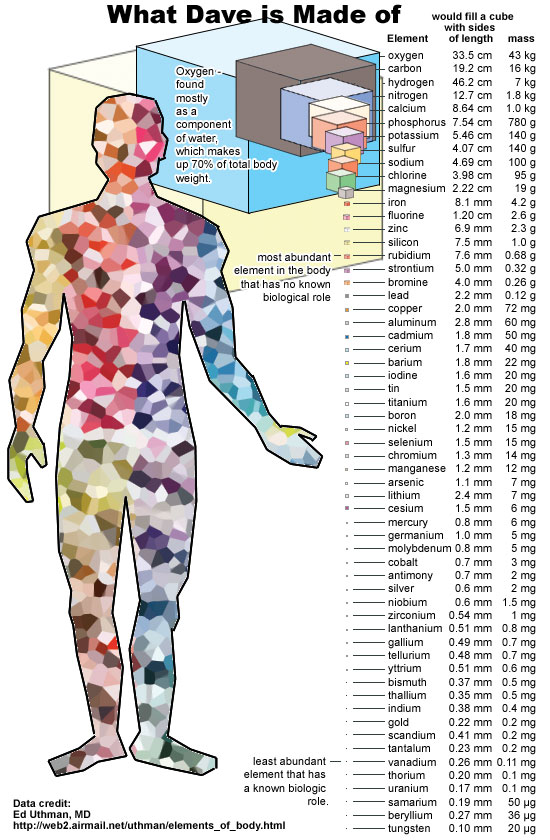
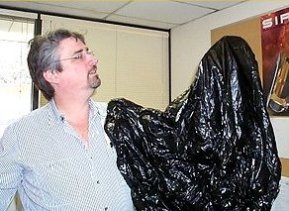



Very interesting. I read about a Russian experiment in which an atom's energy was observed as either being a pulse or a wave. I"m going on my memory so I'm just giving the gist of the experiment. When the atom was left alone and it's energy was recorded it showed a pulse I believe. But when human thought was directed at the atom it's energy showed up in a wave form. Simple thought directed toward it had changed it.
Now since we are made of atoms as is the apparent Universe one must wonder about the ultimate power of our thoughts. The root of our disease or good health can very well be tied to our thoughts for example. From thought action follows. Cause and effect. Karma if you will. Your article makes one think.
@Ethan:
The comparison between "free" neutrons, which decay, and protons of water in a tank (dense) seems not appropriate to me...
We should check "free" protons, without electrons nearby!
Do you know something about protons within a jet of a black hole? Do they disappear after some distance of their journey? Or can we detect them with the expected strength?
Thanks for your clear explanations. Is it known why the proton is so exceptionally stable?
What is the nature of instability? Just speculating...
If instability is dependent on the uncertainty principal, then the neutrons constituents, must form a low energy well, while the proton's constituents must be a very deep energy well; at least a magnitude of 10^35 deeper. Possibly that well is so deep that the Standard model is correct and the Proton is stable.
Darn that penny pinching congress's nixing the ssc! Now we'll never know.
From what I've seen on a Google search, this idea seems to be part of faith-healing scriptures. These articles are a willful distortion of basic physics, and anyone seriously speculating about physics should avoid them like the plague.
@2: The comparison between "free" neutrons, which decay, and protons of water in a tank (dense) seems not appropriate to me...
We should check "free" protons, without electrons nearby!
As I understand it a "free" neutron isn't free because it's not near an electron, but because it's bound in a nucleus to (a) proton(s). It's bound by the strong force, not the electromagnetic interaction of protons with electrons.
@Morgan (6):
wiki "free neutron" says:
"While bound neutrons in stable nuclei are stable, free neutrons are unstable;..."
"free" means "unbound to nucleus".
Nevertheless, even when bound to nuclei, (non-free) neutrons may decay, but their decay time varies with their related kind of atom.
Marty, I think you are misremembering something.
"Now since we are made of atoms as is the apparent Universe one must wonder about the ultimate power of our thoughts."
I did. I ultimately thought that this was a load of hogwash.
"The root of our disease or good health can very well be tied to our thoughts for example."
In a very minor sense, maybe, and probably at several stages removed. E.g. depression -> staying in -> catch a cold (just like if it's winter).
"From thought action follows. Cause and effect. Karma if you will."
What is the causation that makes thought do what you propose? Where is the radiator of energy in the brain to act on a distant particle? Is it electromagnetic in nature? How is it received by the particle?
These are the questions science asks because of skepticism.
If you can answer them, the hypothesis can be tested. If the testing doesn't disprove your hypothesis, it becomes theory and a consensus of its validity will build as evidence for it builds up in the failure to prove it wrong.
This too is science.
But just proclamation that such and such happens is not science.
It's woo.
Hi philipp. I'm not a religious person if that is what is angering you. The great article I just read excited my imagination. To think that we, both you me and everyone and everything are made of atoms, packets of energy that,"can neither be created nor destroyed", is an exciting idea. And energy changes form. I'm suggesting that the cause for this change or effect is the thought of the mind. The mind creates the cause for an effect. Just because I don't understand the nature of our thoughts or the origin does not negate the possibility. To believe that one effect happens randomly seems to err a little on the side of superstition. Action and reaction is more like science to me. A word of advice to you from this layman is for you not to make science into a religion as many do today. Men are not gods either. If you find yourself getting angry when you hear opinions that you disagree with you do not have an open mind at those times. If I am deluded in my thinking why not allow your mind to generate compassion instead of anger? One impulse follows another. A quote by Einstein,
âImagination is more important than knowledge. For knowledge is limited to all we now know and understand, while imagination embraces the entire world, and all there ever will be to know and understand.â
"I'm not a religious person if that is what is angering you"
Who's angry? You should take care that you're not displaying a persecution complex.
We're all of us completely mystified as to what the heck you're wibbling on about, mind (do you have a pair of pencils up your nose and underpants on your head, for example?).
"I'm suggesting that the cause for this change or effect is the thought of the mind."
You're suggesting woo.
Why is the cause possibly due to thought? There's no need for it, nothing explained by it and nothing explaining the causation.
"The mind creates the cause for an effect."
Makes no sense.
"Just because I don't understand the nature of our thoughts or the origin does not negate the possibility."
It does make it nonsense, mind you.
"To believe that one effect happens randomly seems to err a little on the side of superstition."
No it doesn't.
"Action and reaction is more like science to me."
So what action does the mind take that would cause material atoms to change?
THIS is why your statement is nonsense. There is no sense of any coherency in your statements.
"A word of advice to you from this layman is for you not to make science into a religion as many do today."
Which is why we're taking your woo to task. You're proposing mysticism, the basis of all religion.
We're stopping science being made into a religion, thank you very much.
"If you find yourself getting angry when you hear opinions that you disagree"
If you consider any disagreement to be anger directed at you, then you have to consider whether you're making up the motivations of others to make yourself feel better.
"If I am deluded in my thinking why not allow your mind to generate compassion instead of anger?"
Here's a better one: allow it to generate confusion.
Oh, hang on, we are!
It's you that is generating anger. You're projecting anger on others for some reason either opaque to us or easily attributed to a desire to be persecuted, a' la Google Gallileos.
"One impulse follows another."
Identify that impulse correctly.
âImagination is more important than knowledge"
But this is religion. You're not using imagination, you're letting it run riot.
And you're imagining anger when there is confusion and demand for coherency from you.
Ars Technica posted an article yesterday on preliminary LHCb results showing no evidence for supersymmetry. IIRC, SUSY would imply proton decay? So...go, protons! :D
http://arstechnica.com/science/news/2011/08/lhcb-detector-causes-troubl…
Ethan
Excellent summary. I particularly liked the infrared picture of the man holding the plastic bag and the chart of what Dave is made of. And so many other inportant points that you brought in.
Marty
You are quite right about Einstein's quote.
I recall that 70 or more years ago the Russians did a great many paranormal, parapsychology experiments. Telepathy, telekinesis, etc.. As far as I know, Stalin tried to put an end to these experiments; but they continued in secret through much of the cold war. But to my knowledge (or rather my satisfaction); none of these experiments has been independently verified.
Nevertheless serious research continues in the area of brain computer interfaces. The hope is to allow an amputee use a robotic arm or the paralyzed walk. Some brain computer interfaces do not require a physical implant into the brain.
"Real-time functional MRI (rtfMRI) has been used as a basis for brain-computer interface (BCI) due to its ability to characterize region-specific brain activity in real-time. As an extension of BCI, we present an rtfMRI-based brain-machine interface (BMI) whereby 2-dimensional movement of a robotic arm was controlled by the regulation (and concurrent detection) of regional cortical activations in the primary motor areas. To do so, the subjects were engaged in the right- and/or left-hand motor imagery tasks. The blood oxygenation level dependent (BOLD) signal originating from the corresponding hand motor areas was then translated into horizontal or vertical robotic arm movement. The movement was broadcasted visually back to the subject as a feedback. We demonstrated that real-time control of the robotic arm only through the subjectsâ thought processes was possible using the rtfMRI-based BMI trials."
When I first read Marty's comment about "thought", what I thought he meant was not "thought", but "observation". The wave/particle duality oh photons of light demonstrated in the double slit experiment. While shooting photons one at a time though the slits, if you are not watching to see which slit it goes through you get the interference pattern, and see the photons acting with wave life properties. However, if you place a camera or some such other recording device to try and OBSERVE which slit the photon goes through, the pattern you get after a while is just the two bars, implying the photons are acting as particles. This implies that OBSERVATION can have a fundamental impact on particles, but I don't think thought has anything to do with it.
"This implies that OBSERVATION can have a fundamental impact on particles, but I don't think thought has anything to do with it."
Actually observation is irrelevant too.
Detection.
The cat knows it's alive or dead. Bugger the person who opens it some time later, it KNOWS already.
If you set up an experiment to "see" the particle nature of light, it will act like a particle. If you set up an experiment to "see" the wave nature, it will act like a wave.
If you set up one that normally "sees" the wave nature but set up a detector to "see" the particle nature, your experiment no longer is the two-slit experiment. As soon as you're able to detect which slit the photon went through, it's now a particle detector.
The point is the photon isn't a wave or a particle. It's a photon.
But we MODEL it as a wave or a particle depending on what we want to get out of the reaction. Diffraction? Wave. Photoelectric effect? Particle. The photon doesn't change, what we're doing to the photon does.
"It is easy to imagine a state vector for the whole universe, quietly pursuing its linear evolution through all of time and containing somehow all possible worlds. But the usual interpretative axioms of quantum mechanics come into play only when the system interacts with something else, is 'observed'. For the universe there is nothing else, and quantum mechanics in its traditional form has simply nothing to say... quantum mechanics is, at best, incomplete. We look forward to a new theory which can refer meaningfully to events in a given system without requiring 'observation' by another system... Actually, the writers with most physicists a degree of embarassment at consciousness being dragged into physics... It seems likely to us that physics will have again adopted a more objective description of nature long before it begins to understand consciousness... It remains a logical possibility that it is the act of consciousness which is ultimately responsible for the reduction of the wave packet..." J. S. Bell, Speakable and Unspeakable in Quantum Mechanics
"Though the quantum theory treats statistical ensembles in a satisfactory way, we are unable to describe individual quantum processes without bringing in unsatisfactory assumptions, such as the collapse of the wave function... Several physicists have already suggested that quantum mechanics and consciousness are closely related and that the understanding of the quantum formalism requires that ultimately we bring in consciousness in some role or other." David Bohm, The Undivided Universe
Now I don't expect anyone who is seriously scientific or seriously religious to dispute these two great physicists contentions about "consciousness".
Consciousness is one of the great scientific mysteries.
Consciousness is where science and religion intersect with least disagreement; because neither science nor religion have more than a partial understanding.
Jiddu Krisnamurti is the only person that I know of who was declared a living god (the reincarnation of Buddha) and then denied it. "Firmly repudiating the messianic image, in 1929 he dramatically dissolved the large and monied organization that had been built around him and declared truth to be a "pathless land," which could not be approached by any formalized religion, philosophy, or sect. For the rest of his life Krishnamurty insistently rejected the guru status that others tried to foist upon him. He continued to attract large audiences throughout the world but claimed no authority, wanted no disciples, and spoke always as one individual to another."
David Bohm wrote a book On Dialogue. He also in 1980 had a long conversation with Jiddu Krishnamurti. It was recorded and transcibed and can be read in a 266 page book titled The ending of Time. They were friends and also had other discussions which were recorded and published in 1999 under the title, The Limits of Thought. Bohm died in 1992, Krishnamurti in 1986. The cover jacket says, "The Limits of Thought is a series of penetrating dialogues between the unique religious teacher J. Krishnamurti and the renowned physicist David Bohm."
If science and religion are to have dialogue; I know of no better example than those between Bohm and Krishnamurti. Here are two men committed to listening to one another, to clarifying, to penetrating the words, to achieve some shared understanding upon important questions.
Their words are easy but it is hard reading; because they really try to understand one another's understanding.
@11 Wow
Lovely BlackAdder reference.
"We look forward to a new theory which can refer meaningfully to events in a given system without requiring 'observation' by another system... "
Given that the "observation" is "interacting with something else", in what way is another system going to manage to exist?
"Consciousness is where science and religion intersect with least disagreement; because neither science nor religion have more than a partial understanding."
Incorrect. Religion doesn't have ANY understanding of consciousness. At worst, science understands it doesn't understand. Religion, at best, believes it does.
Read up on "emergent properties".
"If science and religion are to have dialogue"
About what? How religion hasn't yet managed to explain a single thing? That's not much fun for either party.
Religion MIGHT be true. But we shouldn't keep banging on about it until it has something that's at least passed a few checks on veracity first. We don't keep talking about Cold Fusion, do we, despite the fact it MIGHT be true. We just let the few people keep beavering away at cold fusion until they turn up with some evidence.
Lets do the same with religion.
Maybe we can then forget about a perfect life after death and start working on a decent one before it.
What boggles me more than anything is that, given the scales at which particles operate, in between the particles, which may or may not be "solid" in any final sense, we are almost entirely composed of the space between them.
We may be pretty persistent, but we are very close to not being here at all.
Of course the words:
"We look forward to a new theory which can refer meaningfully to events in a given system without requiring 'observation' by another system... "
are John Stewart Bell's.
His word have confounded many but inspired some of the best recent quantum physics. It is well worth the effort to read his thoughts in his original papers. He is difficult but readable.
Wikipedia concludes it's summary of John Stewart Bell as follows:
"Bell died unexpectedly of a cerebral hemorrhage in Belfast in 1990. Unbeknownst to Bell, that year he had been nominated for a Nobel prize (which is never awarded posthumously). His contribution to the issues raised by EPR was significant. Some regard him as having demonstrated the failure of local realism (local hidden variables). Bell's own interpretation is that locality itself met its demise.
In 2008 a prize named in honor of John Bell was created by the Centre for Quantum Information and Quantum Control [18] at the University of Toronto. Officially called "The John Stewart Bell Prize for Research on Fundamental Issues in Quantum Mechanics and their Applications," the prize is awarded every other year for significant contributions first published during the six preceding years. The award recognizes major advances relating to the foundations of quantum mechanics and to the applications of these principles. In 2009 the first award was presented by Alain Aspect to Professor Nicolas Gisin, University of Geneva for his theoretical and experimental work on foundations and applications of quantum physics - notably quantum nonlocality, quantum cryptography, and quantum teleportation.[19]"
"His word have confounded many"
Possibly because the explanation of what HE meant by "observations" has been left out by those quoting him.
It's all nice to have his wikipedia entry posted here, but what was the point?
That rabbit pic is awesome! Is it for real?!
@17 Lynxreign & other Ethan's blog regulars
Regarding WOW, my hypothesis.
WOW is a 17 year old, raised in a bullying manner by a very strict quite disfunctional Catholic family. He's relatively smart, still lives at home and is too bullied to come out of the closet about his atheism. So he quietly goes to church every Sunday; but comes to this blog to rage. His understanding of science is at the rote high school level.
Wow is seldom capable of honest self reflection and is dismissive of even the greatest scientists' ponderings. His bullying arrogance (regarding religion and science) is a manifestation of his deep insecurity and sense of powerlessness.
Well that's just my personal hypothesis. One nut case (me) analyzing another (WOW).
How should we respond to WOW?
1) welcome him on this blog, he needs a place and way to vent
2) but ignore him when he is obnoxious
3) engage him only when he behaves respectfully and with reason
I believe that WOW is capable of learning to respect himself.
Your hypothesis is incorrect.
In almost every single instance of assertion.
I respect people who can think. This does cause some of the nonthinkers to have problems.
Too bad.
This is ridiculous, of course humans are sta- >BOOM!<
Dang. Another one bites the dust...
Signed. God.
Did a proton decay in your pocket or are you just happy to see me?
"How should we respond to WOW?"
With some intellectual rigour rather than blatherings would be a good start.
I've no patience with idiots and am completely at home with the idea that idiocy is a state many of us will dip into at one time or another therefore will not assume that just because you've been a blithering buffoon many times before that you will always be a blithering buffoon. This also means that you can be posting scores of insightful and well thought out prose and I will not assume that you will always do so.
So, if you want to know how to respond to me (the real me, not the caricature you've painted to make yourself look better and help you feel superior), intellectual honesty is a good start.
Nice post, Ethan.
Are there any grand unified theories which, if correct, would require protons never decay? Or do most all of the currently favored ones entail protons must decay, yet we're not sure of the probability?
----
Wow, thank you, and personally I think you're more than welcome here. Other than Ethan himself, you're one of the commenters who make me feel welcome, by preventing this place from reeking of BS and utter nonsense.
----
I'm somewhat curious about what instigated the influx of woomeisters on this particular thread. Whence cometh this crackpottery?
Was it the (relative?) stability of the proton itself? I can't imagine how, but I guess with a bit of work that could make for some good nonsense. I don't know; maybe one of Quetzalcoatl's magic tricks is keeping protons from decaying.
Was it the picture outlining the elements in the human body? Was it too "reductionistic," in that it didn't include measurements of souls or whatever magical mental stuff they believe in?
Was it the bunny eating the cookie? Was it just so incredibly awesome that, at least momentarily, it caused some to believe ridiculous things?
Maybe it's due to what I call the "Chopra Effect," that any mention of "quantum"-anything will bring out the loons, chanting their nonsense for no apparent reason. Maybe they just have nothing better to do.
@15 (Wow): Thanks for that explanation. I just started reading Feynman's Quantum Mechanics Book and am still completely baffled by the double slit experiments. The "we model it as a wave or particle" was very helpful. Does that mean that physics does not have a good model yet for photons? Or is the model using both a particle and wave pretty much as good as it gets?
Sorry if the questions are naive, not a physicist just fascinated by the topic.
@sam (30):
In physics you always try to minimize your effort when possible, you simplify as much as you can. Calculating interactions between points, or points within static fields, always is easier than calculating interactions of dynamic fields. Thus you first check, whether your problem could be solved regarding the photon (or electron) as a pointlike particle with some energy (velocity, kinetic energy) on its way. You only get single pointlike results from this method. Only using lots of such single calculations with varying parameters can give you a complete picture, statistically, e.g. in a double slit experiment.
If you instead decide to get the complete picture at once, you use the method with waves and interference. The final result should be the same.
There even exists a middle course: regard the particle as a wave using the Schrödinger-equation...
Unfortunately physics does not have a reasonable physical explanation for real particles constructed from waves so far. What actually "mass" is, the essence of a particle, is one of the famous conundrums of physics so far...
There was an interesting item in the news the other day in which it was estimated that half of the heat flux from the earth's interior was due to nuclear fission. (This was based on neutrino measurements at the Japanese KamLAND detector.) This leaves about 20 TW unaccounted for in the measured flux from the interior. (Best estimate of the heat flux that I could find was 47 +/- 2 TW.)
If you were to assume that all of the missing energy came from proton decay, then my back of the envelope calculation gives a lifetime of about 2.9 x 10^25 seconds for the lifetime of the proton.
On the other hand, if the a bound on the lifetime of the proton of 10^35 years is roughly correct, then proton decay could account for, at most, 0.2 watts of the missing heat flux. Interesting Fermi problem.
..nice one there, really exciting making me to think beyond the molecular level that we often look at the stuffs we are made up.i like it...but what cud possibly be the consequence of our decaying neutrons, of course we are not made of the hydrogen neutrons only?
@Bello (33):
As long as neutrons are components of usual (stable) atoms, they are not "free" and cannot decay. Don't worry...
Selenium is in Glutathione Peroxidase & other enzymes. Rather scarce in NZ soil, so I take supplements.